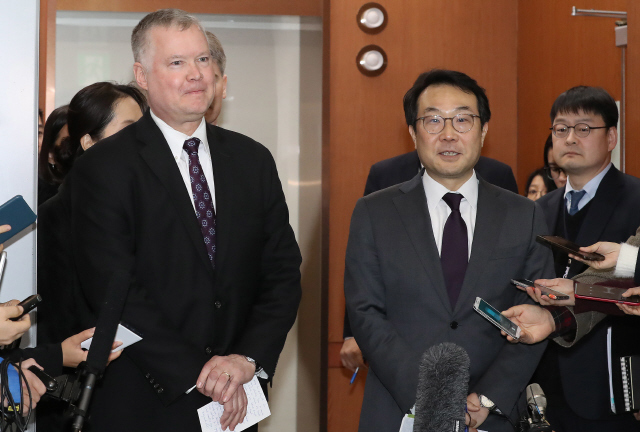 |
|
US State Department Special Representative for North Korea Policy Stephen Biegun talks to reporters at the South Korean Ministry of Foreign of Affairs in Seoul following the South Korea-US working-level meeting on Dec. 21. (Shin So-young, staff photographer)
|
Meeting to focus on sending humanitarian aid and equipment to North Korea
During the second video conference of a South Korean and US working group that will be held on Jan. 17 and 18, the two sides will be discussing issues including providing humanitarian aid to North Korea and sending equipment for video reunions for divided families and equipment for excavating the remains of fallen soldiers into the North. Issues related to the Kaesong Industrial Complex, including a trip to the North by businesspeople with operations at the complex, will probably not be discussed. “We are currently coordinating a South Korea-US working group video meeting within this week,” a Ministry of Foreign Affairs (MOFA) official told reporters on Jan. 15. “Content related to humanitarian aid to North Korea, issues in connection with video reunions among divided family members, and matters of mine removal and exhumation of remains will be topics for interim review,” the official added. Deferred amid a US government shutdown, the South Korea-US working group meeting will be the first in nearly a month, the last one having taken place on Dec. 21. The next question is whether Seoul will be able to proceed with disbursing US$8 million in aid, which has been postponed since a Sept. 2017 decision to contribute to North Korean humanitarian projects by the World Food Programme (WFP) and UNICEF. The South Korean government previously attempted to provide the aid last year, but was reportedly blocked by the US government on the grounds that it could interfere with North Korea’s denuclearization. S. Korea expects deliberations on loosening NK sanctions Visiting South Korea in late December of last year, US State Department Special Representative for North Korea Policy Stephen Biegun hinted that Washington might consider loosening its full-scale ban on North Korea travel by US citizens, which would open a path for aid to be provided. On Jan. 9, Biegun discussed food aid to North Korea as well as public health and healthcare issues in a meeting with US relief group representatives in Washington. With video reunions among South and North Korean divided family members unlikely to take place for the Lunar New Year holiday due to procedures for waiving US sanctions on the necessary equipment, observers are also watching to see if South Korea and the US can reach an agreement at the working-group meeting on waiving sanctions for transporting equipment into North Korea for repairs to the video reunion site. The South Korean government has been holding discussions with the US and UN on the transportation of communication cables, monitors, and other equipment into the North for video reunions among family members as agreed upon with North Korea in the Pyongyang Declaration last September. Multiple foreign affairs authorities expressed the position that the situation has not yet reached the point where a resumption of operations at the Kaesong Industrial Complex can be discussed in South Korea-US working group meetings. In addition to the issue of “bulk cash,” a number of other terms in the current North Korean sanctions also regulate the complex’s reopening. “Joint ventures with North Korea and toll processing are both barred by UN Security Council sanctions,” said one foreign affairs source, explaining that a resumption would entail complex procedures related to the sanctions’ loosening or removal. In his New Year’s address this year, North Korean leader Kim Jong-un stated a willingness to resume operations at the Kaesong Complex and tourism at Mt. Kumgang without conditions. South Korean President Moon Jae-in said at a New Year’s conference that he “very much welcome[d]” the message of willingness to resume the efforts, adding that he planned to “cooperation with the US and the rest of the international community to swiftly resolve the issue of international sanctions.” Commenting on the reopening of the Kaesong Complex, Minister of Foreign Affairs Kang Kyung-wha described the matter as “linked to progress with denuclearization measures.” “We will need to investigate whether there is a way to resolve the Kaesong Industrial Complex issue without cash inflows [to North Korea],” Kang said. By Park Min-hee, staff reporter Please direct comments or questions to [english@hani.co.kr]






